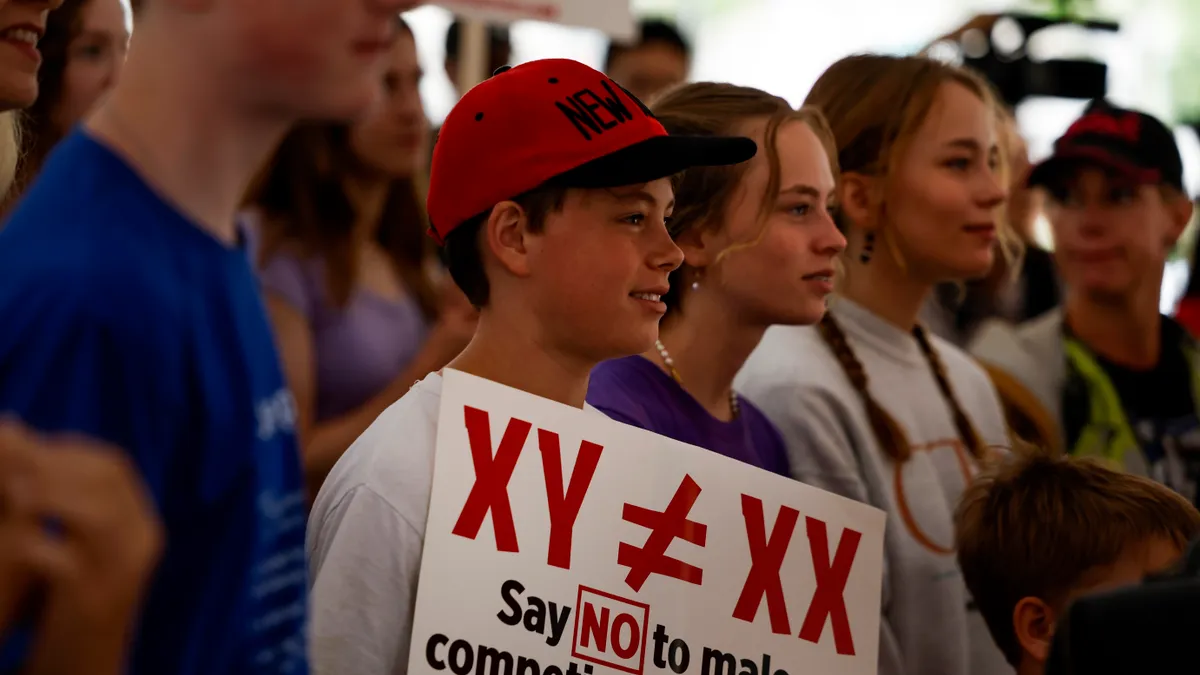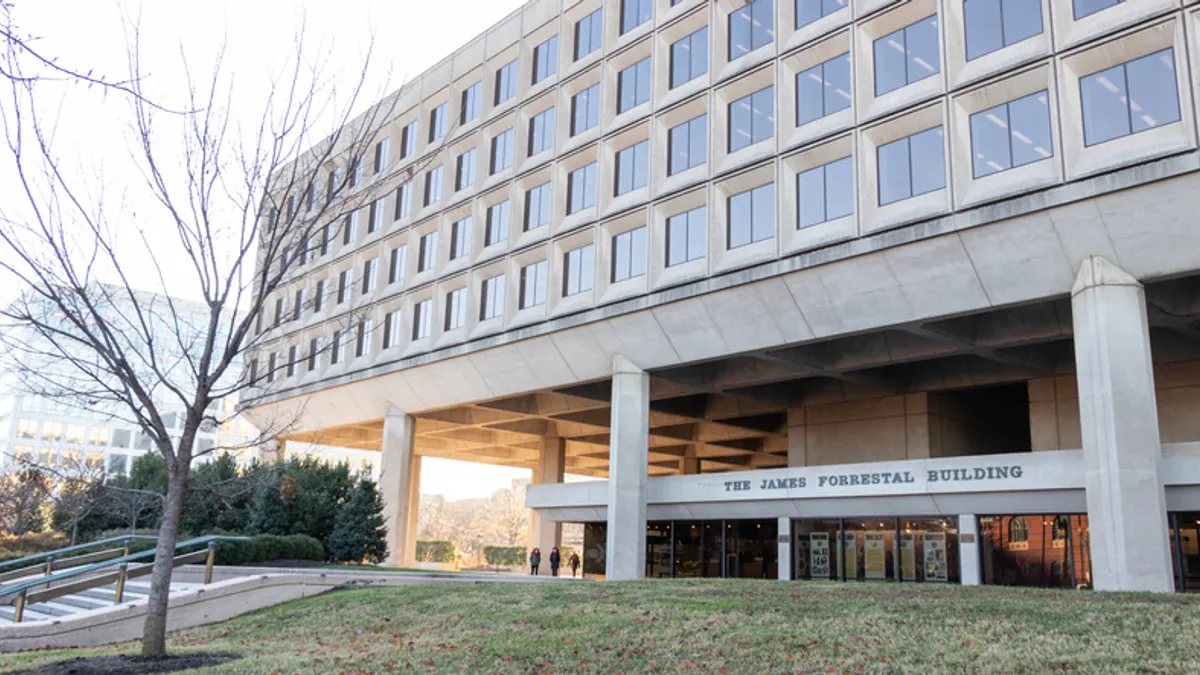The U.S. Department of Education seems to be putting its long-awaited Title IX athletics rule on the back burner, according to a regulatory update from the Office of Management and Budget on Friday.
OMB's Spring 2024 Unified Agenda — which also included updates for high-profile forthcoming regulations on race discrimination and Section 504 — shows the department moved the athletics proposal to a "long-term action" without a rough deadline, meaning the agency doesn't expect a regulatory action within at least the next year.
The controversial rule is expected to provide a framework for schools to include or exclude transgender students from athletic teams aligning with their gender identities.
Previously, the department had listed the regulation as being in the "final rule stage," or one step away from release. Now, however, its final deadline is "to be determined," per the agenda. The department did not respond to a request for comment on the indefinite delay.
The development comes as part of a regular administration update showing which agencies plan to issue rules in the long and short term.
The Title IX rule was originally proposed in April 2023, and was expected to be finalized later that same year alongside the broader Title IX rule, which was made final in April 2024 and provided protections for LGBTQI+ students. However, the department has delayed the athletic rule's release multiple times, citing the high volume of public feedback the proposal garnered.
“The Title IX [athletics] proposal was submitted nine months later" than the broader Title IX proposed rule, said U.S. Secretary of Education Miguel Cardona last month. "It would have been great to put them together. But the reality is we would have had to delay the other one to get through this one."
The athletics proposal garnered over 150,000 comments, compared to the more than 210,000 received by the broader rule. The broader rule took nearly two years to release after it was proposed in June 2022.
Although, rumor had it that the department had delayed the athletic rule's release due to election year politics, the secretary vehemently denied those claims.
“It’s not because of the election," he said during the Education Writers Association’s National Seminar held last month in Las Vegas.
Even if the department issues a Title IX athletics rule, however, the recent U.S. Supreme Court ruling overturning the longstanding Chevron doctrine complicates its path — and the path of many other agency rules. The court's decision, issued in late June, chips away at federal agencies' wide powers to interpret and apply statutes, often carried out through rules and regulations. Now, that power will be tipped to the courts.
December deadline for Title VI
OMB's regulatory update also shows new deadlines for other education policy areas, including racial discrimination and special education protections.
The Education Department has set a December 2024 deadline for releasing a proposed Title VI rule on protecting students from discrimination based on shared ancestry or ethnic characteristics, in addition to other forms of racial discrimination. The department's attention to including shared ancestry under Title VI protections predates the latest Israel-Hamas war, but has increased in the wake of it.
"In this area, OCR has received complaints of harassment and assaults directed at Jewish, Muslim, Hindu, and other students based on their shared ancestry or ethnicity," the update says.
Since October 2023 when the Israel-Hamas war began, the department has warned school districts of a growing number of Title VI complaints born out of antisemitic, Islamophobic, anti-Palestinian or anti-Israeli incidents. The high caseload related to these civil rights complaints, handled by the Office for Civil Rights, even contributed to the secretary's request to Congress for more OCR funding in May.
Section 504 deadline moved
The Education Department set November as the new deadline for a proposed rule for Section 504 covering students with disabilities in schools and colleges. The federal civil rights law protects students against disability discrimination.
The proposed rule was originally expected to be released in August 2023 after about a year of informal requests for public comment and listening sessions.
If the rule is updated, it would be the first major change to Section 504 in 47 years.
Some disability rights advocates have said they hope an updated rule would clarify how Section 504 accommodations for students with disabilities align with the more widely understood civil rights protections for pre-K-12 students under the Individuals with Disabilities Education Act. Better symmetry could boost civil rights protections for all students with disabilities, advocates say.
School administrative groups, on the other hand, have urged the Education Department to validate the separate service protections for special education and Section 504’s accessibility protections. Making those distinctions could improve understanding and implementation by both educators and families, administrative groups have said.
Some of the Section 504 accommodations that students with disabilities could qualify for include extended time on tests for those with ADHD, allowing students with epilepsy to make up work because of a medical appointment or because they had a seizure, and being excused from certain physical activities for students with asthma.
During the 2020-21 school year, IDEA served 14% of elementary and secondary school students, while just 3% were served only under Section 504, according to the Civil Rights Data Collection.
Medicaid rule also expected in November
Another disability-related regulation — also now expected by November — is aimed at easing the process of obtaining parental consent for Medicaid school-based health services.
The proposed rule called for a rare amendment to IDEA regulations that would eliminate a provision requiring one-time parental consent before schools file their first invoices for school-based specialized services provided to children with disabilities who are eligible for public benefits. Those benefits include Medicaid, the Children’s Health Insurance Program, or other public insurance.
No other parental consent procedure under IDEA would be affected.
The final rule was expected in January, but the Education Department missed that self-imposed deadline. In the spring, the department said it was collaborating with the U.S. Department of Health and Human Services’ Centers for Medicare and Medicaid Services to address concerns raised in public comments on the proposed rule.
Nearly 10,000 comments were submitted, with some expressing worry that the change would negatively impact children's out-of-school public insurance benefits. Some school administrative groups, meanwhile, said the proposed change would make the parental consent process more efficient and cost-effective for schools while still protecting participating students' benefits.








 Dive Awards
Dive Awards















